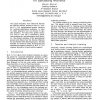Free Online Productivity Tools
i2Speak
i2Symbol
i2OCR
iTex2Img
iWeb2Print
iWeb2Shot
i2Type
iPdf2Split
iPdf2Merge
i2Bopomofo
i2Arabic
i2Style
i2Image
i2PDF
iLatex2Rtf
Sci2ools
116
click to vote
IJCAI
1993
1993
An Analytic Learning System for Specializing Heuristics
This paper describes how meta-level theories are used for analytic learning in M U L T I - T A C . M U L T I - T A C operationalizes generic heuristics for constraint-satisfaction problems, in order to create programs that are tailored to specific problems. For each of its generic heuristics, M U L T I - T A C has a meta-theory specifically designed for operationalising that heuristic. We present examples of the specialisation process and discuss how the theories influence the tractability of the learning process. We also describe an empirical study showing that the specialised programs produced by M U L T I - T A C compare favorably to hand-coded programs.
Related Content
| Added | 02 Nov 2010 |
| Updated | 02 Nov 2010 |
| Type | Conference |
| Year | 1993 |
| Where | IJCAI |
| Authors | Steven Minton |
Comments (0)

